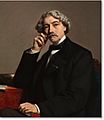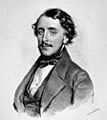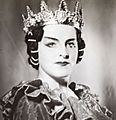Macbeth (opera) facts for kids
Macbeth is a famous opera by Giuseppe Verdi. It's based on Shakespeare’s play with the same name. The opera is usually sung in Italian, though there was also a French version created later. The libretto (which means the words of the opera) was written by Francesco Maria Piave, with some help from Andrea Maffei.
Verdi wrote several operas inspired by Shakespeare's plays, and Macbeth was the very first one. He composed it in 1847. At that time, most Italian operas were about love stories. But Macbeth was different because it didn't have a love story at all! Instead, it tells a dark tale about wanting power so badly that it leads to murder. This opera helped make Verdi very famous, and it's still one of his most popular works today.
Contents
How the Opera Was Created
Andrea Maffei, a poet and friend of Verdi, first suggested that Macbeth would make a great opera. Verdi didn't read Shakespeare's original play until after he had finished composing the music. The words for the opera were written by Piave, who used an Italian translation of Shakespeare's play. Verdi truly loved the story, calling it "one of the greatest creations of man."
The opera follows Shakespeare's story very closely. However, Verdi used a large group of witches in his opera instead of just three, which makes their scenes even more powerful. The first version of the opera, from 1847, was performed a lot across Italy.
Changes for the Paris Version
In 1865, Verdi made several changes to the opera for a new performance in Paris. In France, audiences expected operas to include ballet music. So, Verdi wrote some new music for dancers. He also took the chance to make other improvements to the opera. Even though it was for a French audience, people today still perform this updated version using the original Italian words, not the French translation.
After 1865, Macbeth wasn't performed as often, which disappointed Verdi. He was very proud of this opera and had worked closely with Piave on it. Verdi focused on three main characters: Lady Macbeth, Macbeth, and the Witches. The opera didn't become super popular again until around the time of World War II.
Main Characters in the Opera
| Role | Voice type | First Performed Cast, 14 March 1847 |
Revised Version Cast, 19 April 1865 |
|---|---|---|---|
| Macbeth | baritone (a male singing voice, lower than tenor) | Felice Varesi | Jean-Vital Jammes ("Ismaël") |
| Lady Macbeth | soprano (a high female singing voice) | Marianna Barbieri-Nini | Amélie Rey-Balla |
| Banco (Banquo) | bass (a low male singing voice) | Nicola Benedetti | Jules "Giulio" Bilis-Petit |
| Macduff | tenor (a high male singing voice) | Angelo Brunacci | Jules-Sébastien Monjauze |
| Lady-in-waiting | mezzo-soprano (a female singing voice, lower than soprano) | Faustina Piombanti | Mairot |
| Malcolm | tenor | Francesco Rossi | Auguste Huet |
| Doctor | bass | Giuseppe Romanelli | Prosper Guyot |
| Servant to Macbeth | bass | Giuseppe Romanelli | Péront |
| Herald | bass | Giuseppe Bertini | Gilland |
| Assassin | bass | Giuseppe Bertini | Caillot |
| Three apparitions | 2 sopranos and 1 bass | ||
| Duncano (King Duncan), King of Scotland | Silent (does not sing) | ||
| Fleanzio (Fleance), son of Banco | Silent (does not sing) | ||
| Witches, messengers, nobles, attendants, refugees – these are sung by the chorus | |||
The Story of Macbeth
- Place: Scotland
- Time: 11th century
Act 1: A Prophecy and a Crime
Scene 1: A heath (an open, uncultivated land)
The opera begins with music that you'll hear again later in the famous sleepwalking scene. A group of Witches appear and make a prophecy about the future. A messenger arrives and tells Macbeth that he has been given the title and lands of Cawdor. Macbeth and Banquo, his fellow general, are amazed. Half of the witches' prophecy has already come true! The other half says that Macbeth will become king, and that Banquo’s heirs (his descendants) will be kings after him. The witches dance and sing as the scene ends.
Scene 2: Macbeth's castle
Lady Macbeth reads a letter from her husband. He tells her about the witches' prophecy. She immediately decides that she must make sure Macbeth becomes king. She plans to convince him to murder Duncano (Duncan), the King of Scotland. Macbeth sees a dagger floating in the air before him. He takes it and murders Duncano, who never sings in the opera. Macbeth is horrified by what he has done. His wife is disgusted by his fear. She grabs the dagger, finishes the crime, and smears Duncano’s blood on the sleeping guards.
Banquo and Macduff, a Scottish nobleman, arrive. Macduff discovers the terrible crime. All the characters then sing a powerful song, asking God to punish the murderer.
Act 2: More Murders and a Ghost
Scene 1: A room in the castle
Macbeth is now king. But he is worried about the prophecy that Banquo’s children will become kings. He and his wife decide that Banquo and his son must also be murdered.
Scene 2: Outside the castle
A group of murderers wait for Banquo. They attack him, but his son Fleanzio manages to escape.
Scene 3: A dining hall in the castle
Macbeth welcomes his guests to a feast. Lady Macbeth sings a "brindisi" (a lively drinking song), which is quite famous. Macbeth is told that Banquo has been murdered. But when he returns to the table, he sees Banquo’s ghost sitting in his seat! Macbeth shouts and raves at the ghost. The other people at the feast cannot see the ghost and think Macbeth has gone crazy. The feast quickly ends in chaos.
Act 3: New Prophecies and a Vision
The witches' cave
The witches are gathered around a bubbling cauldron in a dark cave. They sing and then perform a ballet dance, which was added for the 1865 version of the opera. The music sounds very mysterious and magical. Macbeth enters and demands that the witches tell him more about his future.
They call up three apparitions (ghostly figures) for him. The first warns him to beware of Macduff. The second tells him that no man "born of woman" can harm him. The third says he cannot be defeated until Birnam Wood marches against him.
Macbeth is then shown a vision of Banquo’s ghost, followed by eight future Kings of Scotland, all his descendants. This vision confirms that the witches' first prophecy about Banquo's heirs will indeed come true. Macbeth collapses. When he recovers and tells his wife what he saw, she becomes even more determined to kill Banquo’s son and his entire family.
Act 4: The Fall of a Tyrant
Scene 1: Near the border between England and Scotland
Scottish refugees are gathered near the English border. They sing a sad song about how Macbeth, the cruel tyrant, is hurting his people.
Malcolm, Banquo’s son, tells his soldiers to cut branches from the trees in Birnam Wood. They will carry these branches as they march to attack Macbeth's army. They want to free Scotland from Macbeth's harsh rule.
Scene 2: Macbeth's castle
A doctor and a servant watch Lady Macbeth as she walks in her sleep. She is wringing her hands, trying to clean them as if washing away blood.
Scene 3: The battlefield
Macbeth hears that an army is coming towards him. He is also told that the Queen is dead, but he doesn't seem to care much. He gathers his army for battle. Banquo’s army marches against him, carrying their tree branches. The prophecy has come true: Birnam Wood has marched against him!
Macduff confronts Macbeth and they fight. Macduff tells Macbeth that he was not "born of woman" in the usual way, but was "ripped" from his mother's womb (likely by a C-section). The fight continues, and Macduff kills Macbeth. Macduff's men cheer, calling out that Macduff is the new King. All the soldiers and women sing a joyful hymn celebrating their victory.
Images for kids
-
Birgit Nilsson as Lady Macbeth in 1947.
See also
 In Spanish: Macbeth (ópera) para niños
In Spanish: Macbeth (ópera) para niños
 | Sharif Bey |
 | Hale Woodruff |
 | Richmond Barthé |
 | Purvis Young |








